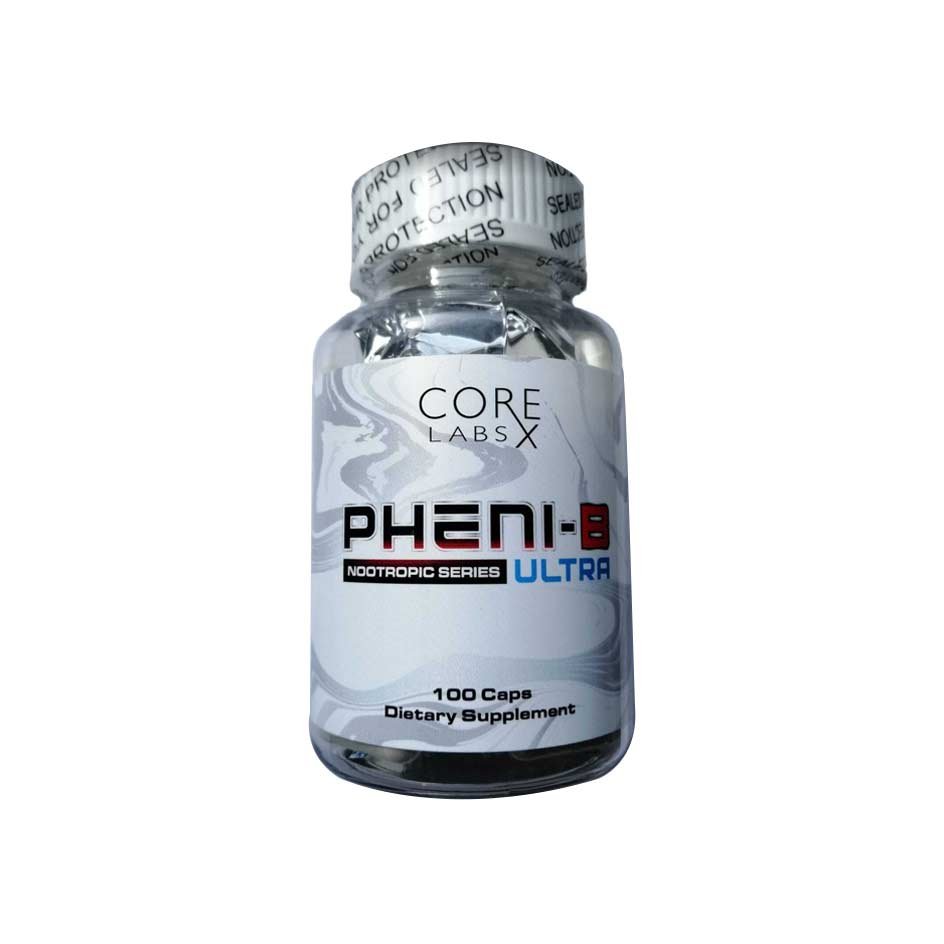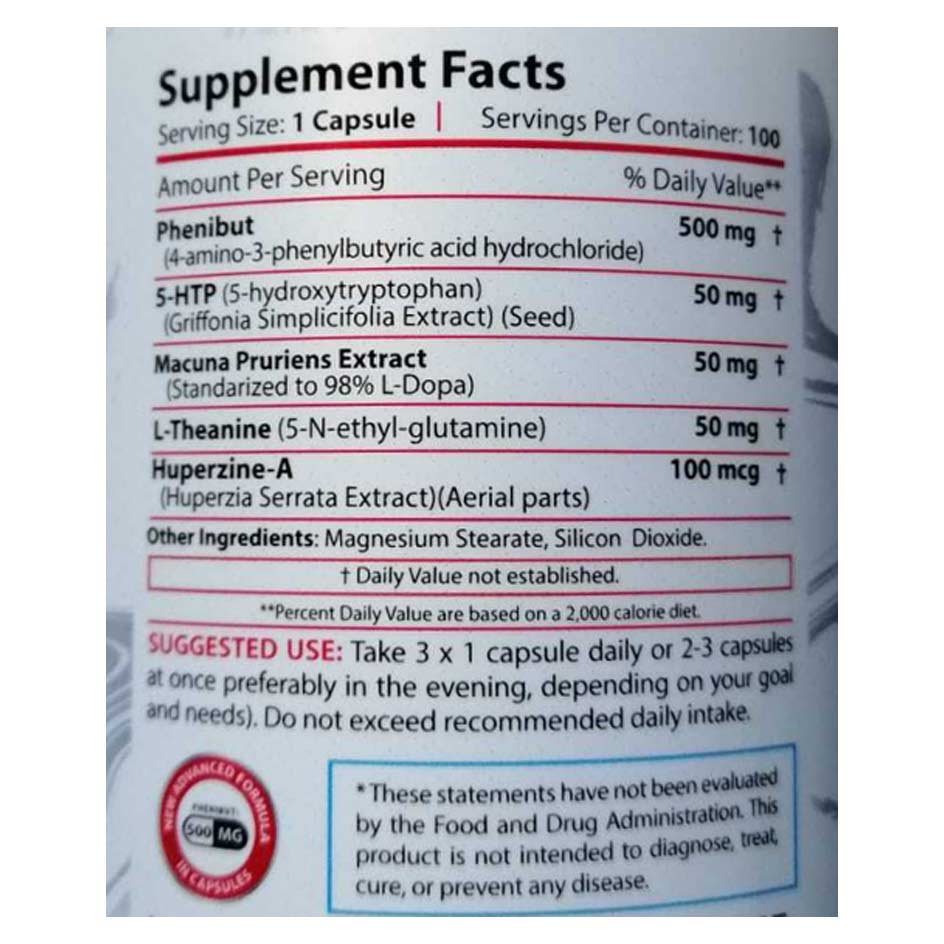What is Phenibut?
Phenibut – the full name is “β-phenyl-γ-aminobutyric acid” – is a chemical compound produced by the neurotransmitterGABA (gamma-aminobutyric acid). GABA regulates the excitability of neurons in the human brain. By docking onto certain receptors, the neurotransmitter stimulates the parasympathetic nervous system, resulting in a reduction in states of excitement such as fear or anger. Instead, a feeling of contentment prevails. However, GABA has a short half-life and cannot penetrate the blood-brain barrier, which is why exogenous administration of GABA as a supplement is only partially effective. Phenibut is different: The substance has a half-life of over five hours, and once it enters the bloodstream, it also penetrates the blood-brain barrier. Phenibut then has a mood-enhancing or (depending on the dose) euphoric effect, increases frustration tolerance, and banishes anxiety and self-doubt.
Phenibut preparations are available internationally in various forms: capsule or powder for oral administration, and spray for nasal administration. Capsule and powder dosage forms are the most common.
The effect of Phenibut
Phenibut has a wide range of effects on both the psychological and physical levels. The most important are:
Psychological Phenibut Effect
- Phenibut has an anxiolytic (anxiety-relieving) effect. The substance was and is used in Russia to treat anxiety and depression.
- Since Phenibut also stimulates the release of the neurotransmitter dopamine (which in turn causes the release of happiness hormones), the administration of Phenibut has a mood-enhancing effect, which is accompanied by increased motivation, confidence and good mood.
Physical Phenibut Effect
- Phenibut has a neuroprotective effect—that is, the substance improves intracellular energy production. For bodybuilders, this means they can train harder and longer under the influence of Phenibut.
- Phenibut also has an anti-hypoxic effect, allowing muscles to better cope with oxygen deprivation. This also contributes to training intensity.
- A 2008 study also shows that GABA-like substances such as phenibut stimulate the release of growth hormone (HGH). (In strength athletes studied, GABA supplementation increased HGH secretion by up to 375%.)Michael E. Powers [2008]:“Growth hormone isoform responses to GABA ingestion at rest and after exercise”).
Medication, psychotropic drug – or sports supplement?
In order to correctly classify Phenibut, one must first know who developed the substance and for what purpose.
Phenibut originated in St. Petersburg, Russia: In 1963, a Soviet researcher synthesized 3-phenyl-4-aminobutyric acid while attempting to produce a drug to calm children with behavioral problems. He called the substance "Phenigamma." Its calming and simultaneously mood-enhancing effects were enormous; its consumption also led to a certain concentration-enhancing effect.
In the course of Soviet efforts to surpass the USA in space travel success, Phenigamma found its way into the Soviet cosmonaut program in the early 1970s under the name "Phenibut." From the 2000s onwards, more and more studies were conducted worldwide on the effects of Phenibut in connection with the treatment of mental illnesses. Among other things, its therapeutic use in post-traumatic stress disorders, depression, anxiety disorders and insomnia was investigated. In 2014, dietary supplements containing the active ingredient Phenibut appeared on the market for the first time. They were marketed either as "smart drugs" to improve mental performance or asTraining booster sold.
Legal status – is Phenibut legal?
The legal status of phenibut is inconsistent across Europe. In the former Eastern Bloc countries of Russia, Latvia, Kazakhstan, and Ukraine, phenibut preparations are legally available in pharmacies. While phenibut is not banned within the EU, it is not approved for human use—preparations containing phenibut may therefore only be traded for experimental purposes. The situation is particularly complicated in Germany: Phenibut is not subject to the Narcotics Act (BtMG), but may be regulated by theNew Psychoactive Substances Act (NpSG, Annex No. 2). Depending on the legal interpretation, trading and acquisition would thus be prohibited in Germany – or not. There is currently no reference case law (as of May 2022).
At least the use of phenibut is not considered doping under WADA. Phenibut is also not tested for in police drug screenings.
Side effects
Phenibut has virtually no harmful side effects, with one serious exception: It is potentially addictive. While addiction isn't a health tragedy, it can become a real psychological problem. Once the brain becomes accustomed to high doses of Phenibut, its release of the neurotransmitter dopamine eventually becomes dependent on stimulation by Phenibut. In other words: Without Phenibut, the addicted brain hardly releases any more dopamine. The result is a persistent low mood that can develop into depression. If an affected person then begins withdrawal, they must proceed very carefully – because abruptly stopping Phenibut intake can lead to permanent psychosis in those with an existing addiction. (This is especially true if extremely high doses were previously consumed regularly.) Therefore, withdrawal must be gradual. Even then, withdrawal is no picnic: It can lead to extreme mood swings, memory impairment, inability to concentrate, and even physical nausea. The withdrawal symptoms are not dissimilar to those of alcohol addiction.
Intake and dosage
Phenibut is effective starting at a dosage of 250 mg per day. Due to its comparatively long half-life, the effect also lasts quite a long time (up to 6 hours). Those new to Phenibut should start with 250 mg once daily. Depending on the intended purpose of Phenibut use, higher doses may also be beneficial.
- Sleep aid
For users who want to use Phenibut to shorten the time it takes to fall asleep or to improve their sleep quality (many users report feeling more rested after sleeping with Phenibut than after normal sleep), 250 mg is sufficient, taken 1-2 hours before going to bed.
- Training booster
If you want to boost your training with Phenibut (Phenibut motivates and increases energy levels during training), take 250 to 500 mg one hour before training.
- General mood improvement, increase in mental performance
Those who want to use Phenibut as a "smart drug" to improve their mood and concentration during the day can take larger doses several times a day. Dosages up to 2,000 mg/day are generally well tolerated; even at 3,000 mg, no psychological problems occur. Phenibut is therefore considered a relatively "safe" psychoactive substance.(cf. Pharmacopsychiatry [2020]:“Safety and tolerability of the anxiolytic and nootropic drug phenibut: A systematic review of clinical trials and case reports”).
Dosages above 3,000 mg are neither necessary nor sensible; they only increase the risk of addiction. User reports circulating online mention 20 g per day—such absurdly high amounts are a direct result of phenibut addiction (and a correspondingly greatly increased tolerance to its effects). Anyone who consistently consumes more than 3 g daily is already addicted.
DANGER:Concurrent use of Phenibut and GABA (as a supplement) can increase the effects of Phenibut and thus lead to addiction, even at lower Phenibut doses. The same applies to concurrent use of Phenibut with brain boosters or training boosters that promote GABA release. It is generally not advisable to consume other psychoactive substances alongside Phenibut.
Capsules, powder or spray?
Most users use Phenibut powder, simply because it's cheaper than any other dosage form. How you consume the powder doesn't matter: You can take it neat and wash it down with a drink, or you can stir it directly into a drink and enjoy the cocktail. The disadvantage of the powder form: The powder has a sour taste that's always noticeable. Therefore, taking it with water isn't enjoyable; it's better to take it with a fruit juice drink.
Capsules are easy to take. They are always flavorless and can be taken anytime, anywhere, with or without liquid. However, they are relatively more expensive than powder.
When using Phenibut nasal spray, the nasal mucous membranes are severely stressed, resulting in a severe burning sensation in the nose. However, the absorption rate is better with nasal administration than with oral administration, allowing significantly lower doses to be used. 100 mg when administered nasally has the same effect as 250 mg when administered orally.
Buy Phenibut – what should you consider?
Anyone wanting to buy Phenibut won't have an easy time finding a source – many supplement shops are reluctant to sell it publicly due to the legal situation in the EU. If Phenibut is offered for order somewhere, buyers are often required to provide a declaration upon purchase stating that they intend to conduct research with the product and how (because Phenibut is not allowed to be sold for human use within the EU).
Once you've found a source and decide on a capsule product, you should ensure that the dosage of each capsule is as low as possible. If the capsules are too high, you won't even have the option of starting with a small daily dose as a Phenibut beginner. Some manufacturers also offer different dosage options for their Phenibut products (for beginners on the one hand and for experienced users on the other). For example, Phenibut from Revange Nutrition is available as500 mg capsule productand as900 mg capsule productavailable.













